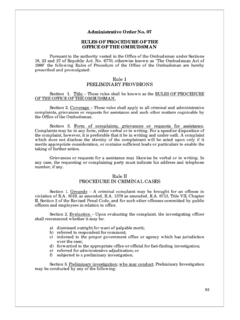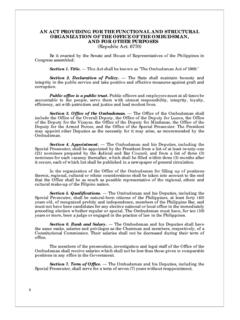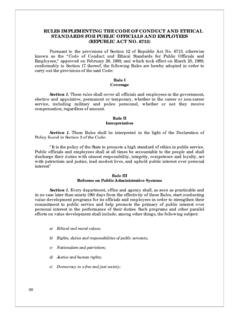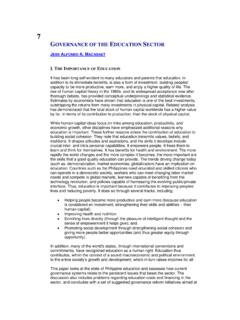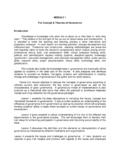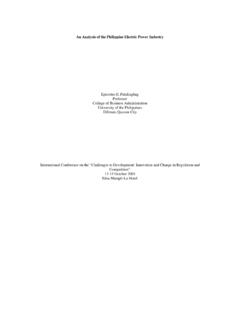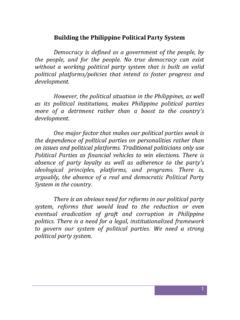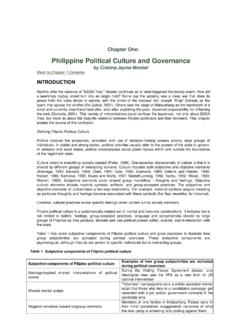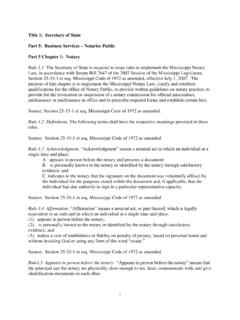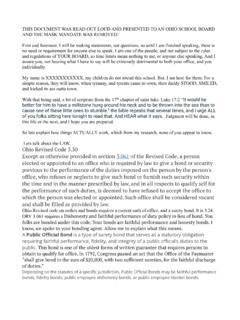Transcription of Revised Penal Code TITLE II CRIMES AGAINST THE …
1 Revised Penal Code TITLE IICRIMES AGAINST THE FUNDAMENTALLAWS OF THE STATEC hapter OneARBITRARY DETENTION OR EXPULSION, VIOLATIONOF DWELLING, PROHIBITION, INTERRUPTION, AND DISSOLUTION OF PEACEFUL MEETINGS AND CRIMES AGAINST RELIGIOUS WORSHIPS ection One. Arbitrary Detention and Expulsion Art. 124. Arbitrary detention. Any public officer or employee who, without legal grounds, detains a person, shall suffer:1. The penalty of arresto mayor, in its maximum period to prision correccional in its minimum period, if the detention has not exceeded three days;2. The penalty prision correccional in its medium and maximum periods, if the detention has continued more than three but not more than fifteen days;3. The penalty of prision mayor, if the detention has continued for more than fifteen days but not more than six months; and 4. That of reclusion temporal, if the detention shall have exceeded six commission of a crime, or violent insanity or any other ailment requiring the compulsory confinement of the patient in a hospital, shall be considered legal grounds for detention of any 125.
2 Delay in the delivery of detained persons to the proper judicial authorities. The penalties provided in the next preceding article shall be imposed upon the public officer or employee who shall detain any person for some legal ground and shall fail to deliver such person to the proper judicial authorities within the period of: twelve (12) hours, for CRIMES or offenses punishable by light penalties, or their equivalent; eighteen (18) hours, for CRIMES or offenses punishable by correctional penalties, or their equivalent; and thirty-six (36) hours, for CRIMES or offenses punishable by afflictive or capital penalties, or their equivalent. In every case, the person detained shall be informed of the cause of his detention and shall be allowed, upon his request, to communicate and confer at any time with his attorney or counsel. (As amended by EO No. 272, July 25, 1987.)
3 This EO No. 272 shall take effect thirty (30) days following its publication in the Official Gazzette)48 Art. 126. Delaying release. The penalties provided for in article 124 shall be imposed upon any public officer or employee who delays for the period of time specified therein the performance of any judicial or executive order for the release of a prisoner or detention prisoner, or unduly delays the service of the notice of such order to said prisoner or the proceedings upon any petition for the liberation of such 127. Expulsion. The penalty of prision correccional shall be imposed upon any public officer or employee who, not being thereunto authorized by law, shall expel any person from the Philippine Islands or shall compel such person to change his Two- Violation of DomicileArt. 128. Violation of Domicile. The penalty of prision correccional in its minimum period shall be imposed upon any public officer or employee who, not being authorized by judicial order, shall enter any dwelling AGAINST the will of the owner thereof, search papers or other effects found therein without the previous consent of such owner, or, having surreptitiously entered said dwelling, and being required to leave the premises, shall refuse to do the offense be committed in the nighttime, or if any papers or effects not constituting evidence of a crime be not returned immediately after the search made by the offender, the penalty shall be prision correccional in its medium and maximum 129.
4 Search warrants maliciously obtained and abuse in the service of those legally obtained. In addition to the liability attaching to the offender for the commission of any other offense, the penalty of arresto mayor in its maximum period to prision correccional in its minimum period and a fine not exceeding 1,000 pesos shall be imposed upon any public officer or employee who shall procure a search warrant without just cause, or, having legally procured the same, shall exceed his authority or use unnecessary severity in executing the 130. Searching domicile without witnesses. The penalty of arresto mayor in its medium and maximum periods shall be imposed upon a public officer or employee who, in cases where a search is proper, shall search the domicile, papers, or other belongings of any person, in the absence of the latter, any member of his family, or in their default, without the presence of two witnesses residing in the same Three.
5 Prohibition, interruption, and dissolution of peaceful meetingsArt. 131. Prohibition, interruption, and dissolution of peaceful meetings. The penalty of prision correccional in its minimum period shall be imposed upon any public officer or employee who, without legal ground, shall prohibit or interrupt the holding of a peaceful meeting, or shall dissolve the same penalty shall be imposed upon a public officer or employee who shall hinder any person from joining any lawful association or from attending any of its same penalty shall be imposed upon any public officer or employee who shall prohibit or hinder any person from addressing, either alone or together with others, any petition to the authorities for the correction of abuses or redress of Four. CRIMES AGAINST religious worshipArt. 132. Interruption of religious worship. The penalty of prision correccional in its minimum period shall be imposed upon any public officer or employee who shall prevent or disturb the ceremonies or manifestations of any the crime shall have been committed with violence or threats, the penalty shall be prision correccional in its medium and maximum 133.
6 Offending the religious feelings. The penalty of arresto mayor in its maximum period to prision correctional in its minimum period shall be imposed upon anyone who, in a place devoted to religious worship or during the celebration of any religious ceremony shall perform acts notoriously offensive to the feelings of the faithful. Revised Penal Code ( TITLE VII) CRIMES COMMITTED BY public OFFICERSC hapter OnePRELIMINARY PROVISIONSArt 203. Who Are public Officers. For the purpose of applying the provisions of this and the preceding titles of this book, any person who, by direct provision of the law, popular election or appointment by competent authority, shall take part in the performance of public functions in the Government of the Philippine Islands, or shall perform in said Government, or in any of its branches public duties as an employee, agent or subordinate official, of any rank or class, shall be deemed to be a public TwoMALFEASANCE AND misfeasance IN OFFICES ection One Dereliction of DutyArt.
7 204. Knowingly rendering unjust judgment. Any judge who shall knowingly render an unjust judgment in any case submitted to him for decision, shall be punished by prision mayor and perpetual absolute 205. Judgment rendered through negligence. Any judge who, by reason of inexcusable negligence or ignorance shall render a manifestly unjust judgment in any case submitted to him for decision shall be punished by arresto mayor and temporary special 206. Unjust interlocutory order. Any judge who shall knowingly render an unjust interlocutory order or decree shall suffer the penalty of arresto mayor in its minimum period and suspension; but if he shall have acted by reason of inexcusable negligence or ignorance and the interlocutory order or decree be manifestly unjust, the penalty shall be 207. Malicious delay in the administration of justice.
8 The penalty of prisioncorreccional in its minimum period shall be imposed upon any judge guilty of malicious delay in the administration of 208. Prosecution of offenses; negligence and tolerance. The penalty of prision correccional in its minimum period and suspension shall be imposed upon any public officer, or officer of the law, who, in dereliction of the duties of his office , shall maliciously refrain from instituting prosecution for the punishment if violators of the law, or shall tolerate the commission of offenses. Art. 209. Betrayal of trust by an attorney or solicitor Revelation of secrets. In addition to the proper administrative action, the penalty of prision correccional in its minimum period or a fine ranging from 200 to 1,000 pesos, or both, shall be imposed upon any attorney-at-law or solicitor (procurador judicial) who, by any malicious breach of professional duty or of inexcusable negligence or ignorance shall prejudice his client or reveal any of the secrets of the latter learned by him in his professional same penalty shall be imposed upon any attorney-at law or solicitor (procurador judicial) who, having undertaken the defense of a client or having received confidential information from said client in a case, shall undertake the defense of the opposing party in the same case, without the consent of his first Two BriberyArt.
9 210. Direct bribery. Any public officer who shall agree to perform an act constituting a crime, in connection with the performance of his official duties, in consideration of any offer, promise, gift or present received by such officer, personally or through the mediation of another, shall suffer the penalty of prision mayor in its medium and minimum periods and a fine of not less than three times the value of the gift in addition to the penalty corresponding to the crime agreed upon, if the same shall have been the gift was accepted by the officer in consideration of the execution of an act which does not constitute a crime, and the officer executed said act, he shall suffer the same penalty provided in the preceding paragraph; and if said act shall not have been accomplished, the officer shall suffer the penalties of prision correccional, in its medium period and a fine of not less than twice the value of such the object for which the gift was received or promised was to make the public officer refrain from doing something which it was his official duty to do, he shall suffer the penalties of prision correccional in its maximum period to prision mayor in its minimum period and a fine of not less than three times the value of such addition to the penalties provided in the preceding paragraphs, the culprit shall suffer the penalty of special temporary provisions contained in the preceding paragraphs shall be made applicable to assessors, arbitrators, appraisal and claim commissioners, experts or any other persons performing public duties.
10 (As amended by Batas Pambansa Blg. 871, approved May 29, 1985.)Art. 211. Indirect bribery. The penalties of prision correctional in its medium and maximum periods, suspension and public censure shall be imposed upon any public officer who shall accept gifts offered to him by reason of his office . (As amended by BP Blg. 871, approved May 29, 1985.)Art. 211 A. Qualified Bribery. if any public officer is entrusted with law enforcement and he refrains from arresting or prosecuting an offender who has committed a crime punishable by reclusion perpetua and/or death in consideration of any offer, promise, gift or present, he shall suffer the penalty for the offense which was it is the public officer who asks or demands such gift or present, he shall suffer the penalty of death. (As added by Section 4, RA No. 7659.)Art. 212. Corruption of public officials. The same penalties imposed upon the officer corrupted, except those of disqualification and suspension, shall be imposed upon any person, who shall have made the offers or promises or given the gifts or presents as described in the preceding ThreeFRAUDS AND ILLEGAL EXACTIONS AND TRANSACTIONSArt.
